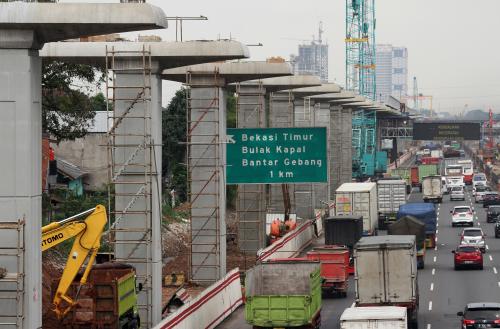Tomorrow, Wednesday, April 15, the Brookings Institution’s Africa Growth Initiative (AGI) will host President of the African Development Bank (AfDB) Donald Kaberuka for a discussion on his vision for sustaining and expanding sub-Saharan Africa’s recent high levels of growth. President Kaberuka has led the continent’s premier financial institution since 2005 and is currently serving his second and final five-year term as president, which will come to a close in September 2015. As his presidency draws to an end, I am taking this time to reflect on some of the efforts the AfDB has undertaken under President Kaberuka’s leadership, including the reorientation of the institution’s lending portfolio to prioritize infrastructure development and regional integration, as well as extending its reach to support global health initiatives, particularly in response to the Ebola epidemic in 2014. I will also be asking him about his lessons learned from his 10 years as the leader of the institution and what he imagines the AfDB’s role will be in the future.
Infrastructure financing and regional integration: During President Kaberuka’s tenure, the AfDB has emphasized the role of robust infrastructure in enabling sound, competitive business environments, which in turn encourage foreign and domestic investment, enhance trade and regional integration, and spur private sector-led growth with the potential for broad-based gains. Since the 1990s, when the AfDB’s infrastructure investments amounted to less than $500 million a year, its infrastructure financing has grown by more than five times to approximately $2.6 billion by 2012. President Kaberuka has strengthened the AfDB’s role in assessing and funding Africa’s infrastructure needs through several key initiatives, such as the Infrastructure Consortium for Africa (ICA), Program for Infrastructure Development (PIDA), and Africa50 Infrastructure Fund, which together provide frameworks for studying African infrastructure performance and gaps, convening meetings to catalyze investment and design policies conducive to infrastructure development, and disbursing funds for infrastructure projects. The AfDB has also focused attention on regional infrastructure projects in recent years (from 2009-2013 it financed more than 70 cross-border operations amounting to $3.8 billion) since it considers effective regional transport and telecommunications networks necessary conditions for regional integration and enhanced competitiveness.[1]
Global health: As the Ebola epidemic spread through Guinea, Liberia, and Sierra Leone in 2014, the AfDB responded by dispensing $223 million throughout the region, joining together with the African Union, United Nations Economic Commission on Africa, and private sector actors to create an Ebola Response Fund (which has provided logistical and financial support for African medical corps), and providing an additional $300 million to fund a regional road transport project aimed at strengthening infrastructure in the three most affected countries. Furthermore, President Kaberuka visited Liberia and Sierra Leone in August 2014 and Guinea in October 2014 to gauge the situation on the ground and provide input to the economic and humanitarian response strategy. He vocally opposed “unnecessary stringent measures” that restricted mobility and trade, including flight bans and border closures, stating, “We need to isolate Ebola, not the countries.”
Given President Kaberuka’s efforts at the AfDB over the past decade, I look forward to asking him a number of questions about the bank’s future priorities and activities, including:
- The current IMF-World Bank spring meetings are the time to revise economic forecasts. Both institutions have revised the 2015 GDP growth forecasts for sub-Saharan Africa downward (by half a percentage point—0.5 percent). Commodity prices are falling, global growth is uneven, China may experience a sharper-than-expected slowdown, and U.S. interest rates are set to increase. Sub-Saharan Africa has just experienced a serious health crisis in West Africa and security risks still loom large both in East Africa and West Africa. How worried should we be? What can be done both at home and abroad to sustain Africa’s growth?
- President Obama will be visiting the continent in July this year and will be attending the sixth annual Global Entrepreneurship Summit (GES) in Kenya. Promoting entrepreneurship is an important policy lever for job creation, and we all know that, with its rapidly growing and young population, Africa needs more jobs. What advice would you have for President Obama on how the U.S. can help the continent promote entrepreneurship?
- U.S. Secretary of State John Kerry met this Monday (April 13) with African Union Commission Chairperson Nkosazana Dlamini Zuma for the African Union Commission High-Level Dialogue and both signed a Memorandum of Cooperation, through which the U.S. Centers of Disease Control (CDC) will provide technical expertise to the African Union to support establishing an African Surveillance and Response Unit and an Emergency Operations Center within the African CDC. As the Ebola crisis appears to be abating, what are the next steps from national governments and the international community? What role can and will the AfDB play in the supporting the post-crisis economic recovery?
- In a recent AGI report, “Financing African infrastructure: Can the world deliver?” Jeffrey Gutman, Soumya Chattopadhyay, and I examine the landscape of African infrastructure financing and find that some sectors, such as energy, attract all types of financing sources—national governments, official development finance, which includes multilateral banks and initiatives such as Power Africa, non-traditional financing partners such as China, and the private sector. However, there seems to be insufficient coordination between all these sources. What role should the AfDB play in enhancing dialogue, coordination, and collaboration in financing across countries and sectors? At the same time, the private sector has been able to finance the explosion of the information and communications technology (ICT) sector in sub-Saharan Africa. However, investments in the sector are leveling off. Are we ready for the next phase of ICT (broadband, internet, etc.)?
- While the AfDB has placed an emphasis on regional infrastructure development in recent years, rapid urbanization and unprecedented growth in many African cities have resulted in huge urban infrastructure needs and inadequate financing. How is the AfDB working to address the challenges posed by urbanization and the need for critical urban infrastructure?
For more insight into African economic development according to the AfDB’s president—and to have the chance to ask President Kaberuka your own questions—please join AGI for the upcoming event: Maintaining the momentum of economic development in Africa: A conversation with African Development Bank President Donald Kaberuka.
[1] For the AfDB’s views on the strategic importance of infrastructure development and its linkages to regional integration please see the AfDB’s Strategy for 2013–2022.



Commentary
Discussing Africa’s development priorities and challenges with African Development Bank President Donald Kaberuka
April 14, 2015